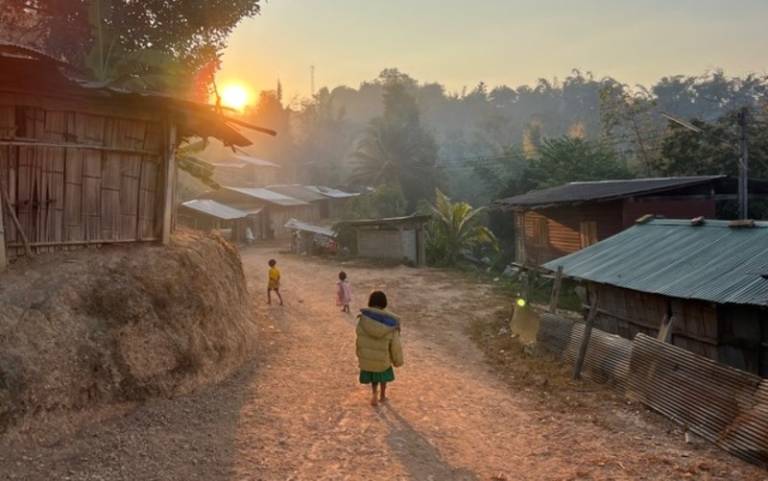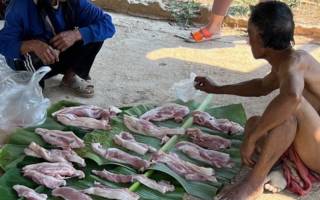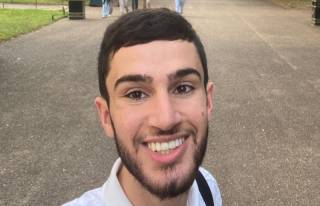A world on fire: The UCL students shaping positive impact around the globe
18 March 2024
Student Journalist, Giovanna Cantarin, interviews two inspiring UCL students, Timothy Jantarungsee and Bashar Raydan, who are making waves in the world, and discovers how they are living as global citizens through their embodied action both within and outside their studies.

Wherever we look, from television to social media, we are inundated with negative news. Images of wars, famines, acts of violence, natural disasters… you name it. When we turn the pages of history, we often wonder why nobody did anything. And yet, it is a perplexing paradox that, when faced with these images, it is easy to think two things: that none of these problems concerns us, or that they concern us all. In the first case, often we do nothing because they do not affect us. In the second case, we are often so overwhelmed that we end up telling ourselves that there is nothing we can do, and so we do nothing. However, there is also another path that we can take.
If we provide ourselves with a given ground that gives us personal legitimacy, we can act and become global citizens through embodied action.
Most of those who actively work to change our world will never be mentioned in history books, but they do give their contribution to a better humanity. Just like hundreds of people at UCL who are spending energies to build bridges among people through their studies. Timothy Jantarungsee, a first-year PhD student in the UCL Linguistics Department, and Bashar Raydan, a first-year Undergraduate student of Geography and Social Data Science, share their uplifting stories with us.
Timothy Jantarungsee: when research becomes outreach
Timothy is a linguist who has always had an interest in lesser-spoken languages and minoritised communities - a topic which has trancended personal interest and driven his area of study. Timothy has been conducting fieldwork with the Mlabri, one of the smallest ethnic groups living in Thailand. His research has had an impact, not only on academia, but also on the personal lives of these people, who are now slowly being recognized by the government of Thailand.

His project took three years of planning, where most of the first year was just spent reading. You could argue that the first way of helping others is to educate yourself. For Timothy, this research and the Mlabri people soon turned into much more than just data.
“Hearing about human suffering is one thing. Going there, experiencing it, and seeing it with your own eyes is another thing. It was a reality check, and I was not expecting that. It should be obvious: if you are going to work with minoritised people, there is going to be suffering, but it hit me. My research was like taking a picture of suffering, and every time I look at my research, I get reminded. Whether you are a researcher or a humanitarian worker or anything, you are going to have insane privileges and dealing with your privilege in that sense is difficult.”
That is why Timothy decided that he would do something, thus, that research also became outreach.
“There is an enormous difference between research and outreach. Research is just what I write on a piece of paper hoping it gets published, and only very select few people care about it. Outreach is how you give back to the community using whatever you can offer. In the case of linguists, a good way to do outreach is by trying to create and publish a dictionary of their language to give back to the community, especially in endangered languages, where in a few generations the kids might not be able to speak anymore. So, my work is trying to find balance between the two.”
However, Timothy's work has certainly had a significant impact and the first results should show very soon, when the members of the community will get the National Citizenship Card. Timothy has been in contact with government officials in the area to make this happen, because, “once they get that, they will have access to health care and other public services. Even though they live extremely far away from the closest hospital, it is still nice to have, and it still means they are a recognised citizen, whatever happens.”
Bashar Raydan: love as a means of change
Of the same idea is Bashar, who thinks that, “people should not feel that they are morally deficient or ethically bankrupt simply because they ran out of solutions to fix a particular problem. Real life is not like the philosophical trolley problem, we have so much more agency to come up with mobile solutions where neither the five nor the one can be harmed. Small steps taken to make change are extremely important.”
Bashar volunteers, alongside his studies, with the Arab League Network for Youth in Education. He reviews applications written by North Sudanese kids aged 14 to 17 who want to continue studying outside of the country because of limited resources within their area. His association then tries to match them with schools in Egypt, Libya, Jordan and Europe, who are willing to offer places and scholarships for students coming from conflict zones. They help them obtain visas to go out of the country; sometimes, they also try to help the whole family move out of Sudan by getting them registered in another country as refugees. When this is not possible, they try to give them access to education by alternative methods like data bundles and books. In some cases, they organise for groups of pupils to study together in one place so that they can continue learning.
“Whenever I do this, I feel that I’m privileged, because being able to act is a privilege, and I can move a bit beyond that monopoly of privilege, to try to extend that, so that it encompasses everyone.”
Bashar has been working in education charities for several years now. His passion for this cause comes from his idea of ‘love as a means of change’.
“Any work that is done to change the world is a labour of love, and it is essential because it crafts a new world where education is for everyone, and the systems we have in place are there to benefit everyone. Love teaches us that pain is not the end, and we need to equip kids with passion. Through love, you learn that you cannot change a framework or dismantle it while engaging with it, except by loving that framework.”

'What You Gonna Do When the World's on Fire?’
There is a 2018 film directed by Italian director Roberto Minervini whose title comes from an old gospel: 'What You Gonna Do When The World's On Fire?’. ‘World on Fire’ is also the title of the book by Amy Chua, and 'Our House Is on Fire' that of the bestseller co-authored by Greta Thunberg. The list goes on. In short, everyone - or almost everyone - seems to agree that the world is burning down.
Going through the annals of the world, we see that human struggles repeat themselves. And while one day you are in the position to help, the next day you might be in the position to be helped. Somebody else’s problem is not immediately our problem, but that is not just about the person. It is about an intertwined struggle that concerns us all. This speaks to the idea of where we position ourselves in relation to events that are happening in the world.
Are we part of them or are we just witnessing from the outside? So, the real question is, whatever your place is, 'What You Gonna Do When The World's On Fire?’
My advice would be to take any small step you can. Whether you want to join the Volunteering Society, apply to become one of the UCL Changemakers, or do something completely different, there will always be something that you can do to create positive impact.
About the Author
Hi! I'm Giovanna, and I am currently navigating my first year as an undergraduate in the Experimental Linguistics program. My passion lies in amplifying the voices that often go unheard, as well as sowing the seeds of curiosity. As a Student Journalist, I hope to hone my outreach skills and contribute my part to the vibrant UCL community, sparking a ripple of positive change, however small it may be.
Photo credits: Timothy Jantarungsee and Bashar Raydan.

 Close
Close

